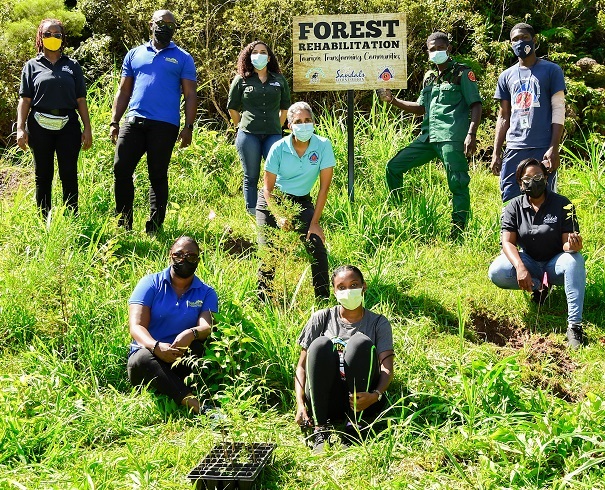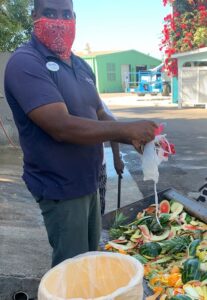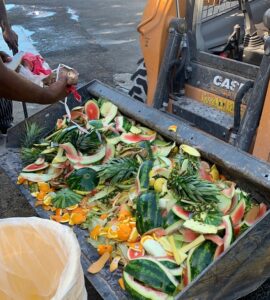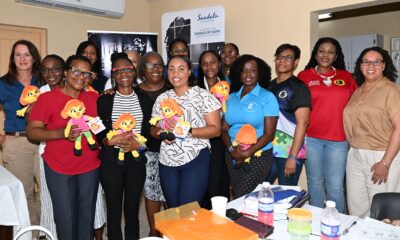Caribbean News
Expanded Tree Planting Mission Further Strengthens Regional Sustainability
Published
4 years agoon

#TheCarribean, April 22, 2022 — Gearing up to celebrate the fulfillment of its 10,000-tree planting commitment, the Sandals Foundation is expanding its conservation goal by adding another 10,000 trees to strengthen the Caribbean’s climate resilience and food security.
The massive conservation effort is in keeping with this year’s global Earth Day theme, ‘Invest in Our Planet’, and builds on the foundation’s larger Caribbean Tree Planting Project commitment, which is being coordinated by the Caribbean Philanthropic Alliance in collaboration with the Trees That Feed Foundation, the Clinton Global Initiative, and other partners.
Last April, the teams together announced plans to plant one million trees across 14 Caribbean countries by June this year. Now, with over 9,600 ornamental and food bearing trees already planted by the Sandals Foundation and its partners, the philanthropic arm of Sandals Resorts International is increasing the stakes.
“The environment around us is not only our home, but everything that keeps us alive,” said Heidi Clarke, executive director of Sandals Foundation. “Investing in the long-term viability of these natural environments will help to strengthen the many ecosystems that are critical for providing food, water, and protecting our communities and livelihoods, improving the way of life in the region for locals and tourists alike to enjoy.”
- Region specific activities
Outside of its tree planting mission, here in the Turks and Caicos Islands, the Sandals Foundation plans to establish community compost training in an effort to strengthen food security, increase solid waste management, and adopt climate smart agricultural practices. The island of Providenciales is known for having far less fertile soil with limited farmers or localized sources of produce. Now, through its Beaches Turks and Caicos resort, team members will lead the composting efforts, providing an opportunity for students and farmers from surrounding communities to learn, participate, and share the acquired knowledge and practices with their communities.
“Environmental education is an important part of our conservation efforts,” said Georgia Lumley, environmental coordinator at Sandals Foundation. “By collaborating with key organisations, students are learning about the importance of protecting the environment and endangered species while participating in activity execution through eco-camps and field trips.”
In Barbados, the Foundation’s conservation efforts will see to the enhancement and improving the eco-offering and experience at the historic Andromeda Botanic Gardens by adding an ethnobotanical garden with an outdoor classroom, creative signage, and the planting of 30 trees. Sandals Foundation, in collaboration with the park’s managers, Passiflora Limited, is creating a haven for native and regional plants, their cultural uses, the associated biodiversity, and a resource for the Barbadian community.
Last year, with support from the Sandals Foundation, the Grenada Fund for Conservation planted 4000 mangroves. Now, with the upcoming infrastructural improvements and training of community guides at Woburn Interpretive Centre, the initiatives will strengthen the island’s coastline and build on their efforts to encourage eco-tourism respectively.
In Jamaica, over 2000 timber trees have been planted as part of reforestation and conservation efforts at the biodiversity hotspot of the UNESCO World Heritage Site—the Blue and John Crow Mountains National Park. The area which contains 50 percent of the island’s endemic plants, is managed by the Jamaica Conservation and Development Trust, with whom the Foundation partners to activate its initiatives.
Team members from Sandals and Beaches Resorts have also rolled up their sleeves and, together with representatives from the Forestry Department and the Mustard Seed Community in Jamaica have planted almost 200 food-bearing trees in communities, with plans to plant 600 more by June.
The careful management of invasive species is also a key component in the philanthropic arm’s conservation effort.
In The Bahamas, Sandals Foundation ambassadors along with the Bahamas National Trust are set to remove invasive species and plant some 1000 trees in the Lucayan National Park. Through the engagement of student volunteers, the islands will continue its rich tradition of promoting environmental education among its young people, thereby fostering the next generation of environment stewards.
invasive species and plant some 1000 trees in the Lucayan National Park. Through the engagement of student volunteers, the islands will continue its rich tradition of promoting environmental education among its young people, thereby fostering the next generation of environment stewards.
“We are educating students and communities throughout the region on the importance of removing invasive species as we enter spaces they occupy and plant native species,” “We have supplemented these removals with reforestation activities that include the planting of food-bearing trees, such as what we continue to support at Signal Hill in Antigua,” said Lumley.
The construction of a shade house at Wallings Nature Reserve in the twin island territory will also contribute to the charitable arm’s conservation efforts, which began in that area last year with the planting of 1,008 food-bearing trees.
The Sandals Foundation has an extensive record of environmental conservation. Over the past 13 years, the organisation has planted over 17,000 fruit and ornamental trees throughout the Caribbean by galvanizing the support of Sandals and Beaches Resorts team members, community groups, partners, travel agents, guests, students, and volunteers.
This year, the entity remains committed to increasing forest coverage, protecting wildlife, enhancing biodiversity, creating eco-tours, educating children and empowering communities to take part in conservation.
Persons wishing to support the tree planting efforts can visit the Sandals Foundation website at www.sandalsfoundation.org and donate to the ‘Caribbean Tree Planting Project’. One hundred percent of all funds donated will be directed towards purchasing seedlings and maintaining the plant sites to ensure tree survival.
Press Release: Sandals Foundation
You may like
-


Beaches Turks and Caicos sets the Benchmark for Biodiversity in the TCI
-


Turks and Caicos Corporate Community Join Beaches Resort to Raise Funds for Jamaica’s Hurricane Melissa Relief
-


Sandals Foundation and Great Shape Inc.! Produce More than 3000 Smiles in Providenciales
-


Sandals Foundation Pack for a Purpose donates School Supplies to eight schools in Providenciales
-


MORE EMPHASIS BEING PLACED ON CHILDREN WITH AUTISM
-


Helping Children Grow Strong Inside and Out: Sandals Foundation and Sesame Workshop Host Emotional Well-Being Workshop in Turks & Caicos
Caribbean News
Seven Days. Seven Nations. One Storm — Hurricane Melissa
Published
3 months agoon
November 1, 2025
A week of wind, water, and heartbreak
From Haiti’s hillsides to Bermuda’s reefs, seven Caribbean nations have been battered, bruised, and forever marked by Hurricane Melissa — a storm that tested not only the region’s infrastructure but its unshakable spirit of unity.
Saturday–Sunday, October 25–26 – The First Strike: Hispaniola
Before the storm even earned its name, torrential rain and flash floods swept across Haiti and the Dominican Republic, claiming lives and tearing through rural communities.
tearing through rural communities.
In southern Haiti, rivers burst their banks, swallowing roads and homes; 23 people were confirmed dead by Sunday evening. Across the border, one death was reported in the Dominican Republic as swollen rivers cut off villages in Barahona and Pedernales.
By nightfall, the tropical system had strengthened — and the Caribbean knew it was facing something historic.
Monday, October 27 – Evacuations and Airlifts
In The Bahamas, Prime Minister Philip Davis issued a mandatory evacuation for the MICAL Islands — Mayaguana, Inagua, Crooked Island, Acklins, Long Cay, and Ragged Island.
Bahamasair added extra flights as the nation braced for what forecasters warned could become the strongest storm in nearly two decades.
Meanwhile, Jamaica, Turks & Caicos, and Cuba activated their national emergency operations centers.
Tuesday, October 28 – Jamaica and Haiti Hit Hard
By afternoon, Hurricane Melissa made landfall near St Elizabeth, Jamaica, as a Category 5 hurricane — winds of 185 mph, central pressure 892 mb, the lowest ever recorded so close to the island.
Roads collapsed, bridges washed away, and Black River Hospital lost its roof. Power failed for 72 percent of the island.
BOJ TV footage shows split asphalt, sparking lines, and flooded communities abandoned for safety.
Initially four were reported dead, that grew to seven deaths and heavy damage in 170 communities; Andrew Holness, Jamaican Prime Minister calling it “a national test of resilience.”
Haiti, still recovering from the weekend’s flooding, was hit again as outer bands dumped more rain on Les Cayes and Jacmel, deepening the humanitarian crisis.
Wednesday, October 29 – Crossing to Cuba
Weakened slightly to Category 4 (145 mph), Melissa tracked north-northeast at 8 mph, hammering eastern Cuba with hurricane-force winds
and mudslides. Over 15 000 people were evacuated from Santiago de Cuba and Holguín.
In Turks & Caicos, the Regiment deployed to Grand Turk, Salt Cay, South, North and Middle Caicos, preparing shelters and securing public buildings.
Thursday, October 30 – The Bahamas and the All Clear
Melissa’s speed increased, sparing the northern Caribbean its worst.
The Bahamas Airport Authority closed 13 airports from Mayaguana to Exuma International; none reported casualties, though infrastructure suffered.
In Turks & Caicos, the all-clear came early Thursday after minimal impact. Premier Washington Misick expressed gratitude and pledged support for neighbors:
“We must act — not only with words, but with compassion and deeds.”
Friday, October 31 – Counting the Cost
By Friday, Melissa had weakened to Category 3 (120 mph) north of Cuba.
The Bahamas Department of Meteorology issued its final alert, lifting warnings for the southern islands.
Regional toll:
- Haiti: 23 dead, thousands displaced.
- Jamaica: 7 dead, 170 communities damaged; 72% without electricity
- Cuba: 2 dead, 15, 000 evacuated.
- Dominican Republic: 1 dead, flooding in southwest.
- Bahamas: 0 dead, minor infrastructure damage and flooding in southeast.
- Turks & Caicos: minimal to no impact.
Relief and Reconnection
The Cayman Islands became the first government to touch down in Jamaica post-storm. Premier Juliana O’Connor-Connolly led a contingent bringing a plane-load of essentials and pledged US $1.2 million in aid.
Reggae icon Shaggy arrived on a private jet with friends, delivering food, medical kits, and hygiene supplies.
Meanwhile, Starlink and FLOW Jamaica activated emergency satellite internet across Jamaica providing free connectivity through November.
From overseas, U.S. President Donald Trump, speaking during his Asia tour, announced that American search-and-rescue teams and disaster aid will support the region.
“They can depend on U.S. assistance as they recover from this historic storm,” he said.
Faith, Funds, and False Websites
The Government of Jamaica and the Sandals Foundation have both launched verified donation portals for recovery. Officials are warning against fake crowdfunding pages posing as relief sites and urging donors to use only official channels.
A Seventh Nation in the Crosshairs – Bermuda
As Hurricane Melissa left the Caribbean basin, Bermuda found itself next in line.
Forecasts indicated the storm would pass just west of the island late Thursday into Friday, likely as a Category 1 to 2 hurricane with sustained winds near 105 mph.
Though far weaker than when it ravaged Jamaica, officials issued a hurricane warning, urging residents to secure property and expect tropical-storm conditions.
By all appearances Bermuda is heeding the warnings
The Human Response
Across the Caribbean, solidarity surged.
The Global Empowerment Mission (GEM) in Miami began airlifting relief supplies, while churches, civic groups, and businesses in The Bahamas and Turks & Caicos organized drives for displaced families.
“Your dedication gave our islands the strength to face the storm,” Premier Misick said. “Together, as one Caribbean family, we will rise stronger.”
Resilience in the Wake
Melissa’s winds may have faded, but her impact endures. Engineers are inspecting bridges, hillsides, and water systems; volunteers are clearing debris and distributing aid in communities still cut off.
From Haiti’s ravaged river valleys to Jamaica’s sugar towns, from Cuba’s eastern hills to The Bahamas’ salt ponds and Bermuda’s reefs, the region once again stands at the crossroads of ruin and renewal — and leans, as always, toward hope and a faithful God
Caribbean News
Haitian Pushback Halts Controversial Constitution Rewrite — What’s Next?
Published
4 months agoon
October 15, 2025
Deandrea Hamilton | Editor
Haitian media, legal scholars and civic voices did what bullets and barricades couldn’t: they stopped a sweeping constitutional overhaul widely branded as anti-democratic. Editorials and analyses tore into proposals to abolish the Senate, scrap the prime minister, shift to one-round presidential elections, expand presidential power, and open high office to dual-nationals—a package critics said would hard-wire dominance into the executive at a moment of near-lawless insecurity.
The Venice Commission—Europe’s top constitutional advisory body—didn’t mince words either. In a formal opinion requested by Haiti’s provisional electoral authorities, it pressed for clear legal safeguards and credible conditions before any referendum, including measures to prevent gang interference in the electoral process—an implicit rebuke of pushing a foundational rewrite amid a security collapse.
Facing that drumbeat, Haiti’s Transitional Presidential Council has now formally ended the constitutional-reform initiative. The decision, taken at a Council of Ministers meeting at the National Palace, effectively aborts the rewrite track that has haunted Haiti since the Moïse and Henry eras.
So what now? Per the Miami Herald, the pivot is back to basics: security first, elections next. That means stabilizing Port-au-Prince enough to run a vote, rebuilding the electoral timetable, and empowering the provisional electoral machinery—none of which is simple when gangs control vast chunks of the capital and state authority remains fragile. Recent headlines underline the risk: gunfire has disrupted top-level government meetings, a visceral reminder that constitutional theory means little without territorial control.
Bottom line: Haitian journalists and public intellectuals helped slam the brakes on a high-stakes centralization of power that lacked legitimacy and safe conditions. International constitutional experts added weight, and the transition authorities finally conceded reality. Now the fight shifts to making an election possible—clean rolls, secure polling, and credible oversight—under circumstances that are still hostile to democracy. If the state can’t guarantee basic safety, any ballot is theater. If it can, shelving the rewrite may prove the first real step back toward consent of the governed.
Caribbean News
Political Theatre? Caribbean Parliamentarians Walk Out on House Speaker
Published
4 months agoon
October 14, 2025
By Deandrea Hamilton | Magnetic Media
October 14, 2025 – It’s being called political theatre — but for citizens, constitutional watchdogs, and democracy advocates across the Caribbean, it feels far more serious. Within a single week, two national parliaments — in Trinidad and Tobago and St. Kitts and Nevis — descended into turmoil as opposition members stormed out in protest, accusing their Speakers of bias, overreach, and abuse of parliamentary procedure.
For observers, the walkouts signal a deeper problem: erosion of trust in the very institutions meant to safeguard democracy. When Speakers are viewed as political enforcers instead of neutral referees, parliaments stop functioning as chambers of debate and start performing as stages for power and spectacle — with citizens left wondering who, if anyone, is still accountable.
October 6: St. Kitts Parliament Erupts
The first walkout erupted in Basseterre on October 6, 2025, when Dr. Timothy Harris, former Prime Minister and now Opposition Leader, led his team out of the St. Kitts and Nevis National Assembly in a protest that stunned the chamber.
led his team out of the St. Kitts and Nevis National Assembly in a protest that stunned the chamber.
The flashpoint came as the Speaker moved to approve more than three years’ worth of unratified parliamentary minutes in one sitting — covering 27 meetings and three national budgets — without individual review or debate.
Dr. Harris called the move “a flagrant breach of the Constitution and parliamentary tradition,” warning that the practice undermines transparency and accountability. “No serious parliament can go years without approving a single set of minutes,” he said after exiting the chamber.
The Speaker defended the decision as administrative housekeeping, but critics were unconvinced, branding the move a “world record disgrace.” The opposition’s walkout triggered renewed calls for the Speaker’s resignation and sparked a wider public discussion about record-keeping, accountability, and respect for parliamentary norms in St. Kitts and Nevis.
October 10: Trinidad Opposition Follows Suit
Four days later, on October 10, 2025, the Opposition United National Congress (UNC) in Trinidad and Tobago staged its own walkout from the House of Representatives in Port of Spain.
The UNC accused the Speaker of partisan bias, claiming she had repeatedly blocked urgent questions, ignored points of order, and allowed government members to breach standing orders without consequence.
“The Speaker has failed in her duty to act impartially,” the Opposition declared in a statement. “Parliament is not the property of any political party or Presiding Officer.”
The dramatic exit was seen as a culmination of months of rising tension and frustration, with opposition MPs arguing that parliamentary rules were being selectively applied to silence dissenting voices.
Political analyst Dr. Marcia Ferdinand described the twin walkouts as “a warning sign that parliamentary democracy in the Caribbean is teetering on the edge of performative politics.”
“When chairs become political shields rather than constitutional referees,” she said, “democracy becomes theatre, not governance.”
A Pattern Emerging
While St. Kitts and Trinidad are very different political environments, both incidents point to the same regional fault line: the perception that Speakers — the guardians of parliamentary order — are no longer impartial.
In Westminster-style systems like those across the Caribbean, the Speaker’s authority depends not on power but on public confidence in fairness. Once that credibility erodes, parliamentary control collapses into confrontation.
Governance experts say the implications are serious: eroded trust between government and opposition, declining public confidence in state institutions, and growing voter cynicism that “rules” are flexible tools of political advantage.
Why It Matters
Parliamentary walkouts are not new in the Caribbean, but what makes these recent events different is their frequency and intensity — and the regional echo they’ve created. Social media has amplified images of lawmakers storming out, with citizens from Barbados to Belize questioning whether the same erosion of decorum could be happening in their own legislatures.
the regional echo they’ve created. Social media has amplified images of lawmakers storming out, with citizens from Barbados to Belize questioning whether the same erosion of decorum could be happening in their own legislatures.
Analysts warn that if this perception takes hold, it risks diminishing the moral authority of parliamentary democracy itself.
“Once opposition MPs believe the rules are rigged, and once citizens believe Parliament is just performance,” said one Caribbean governance researcher, “you’ve lost the most valuable currency in democracy — trust.”
Restoring Balance
Political reformers across the region are calling for tighter Standing Order enforcement, independent parliamentary service commissions, and training to strengthen Speaker neutrality. Civil society leaders say the public must also play its part by demanding transparency and refusing to normalize partisan manipulation of parliamentary procedure.
Whether these twin walkouts become catalysts for reform — or simply another episode of Caribbean political theatre — will depend on what happens next inside those chambers.
For now, democracy watchers agree on one thing: when opposition leaders feel the only way to be heard is to walk out, the entire democratic house — not just its Speaker — is in danger of collapse.
Angle by Deandrea Hamilton. Built with ChatGPT (AI). Magnetic Media — CAPTURING LIFE.






